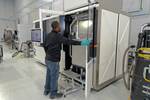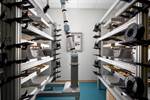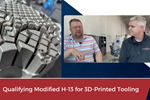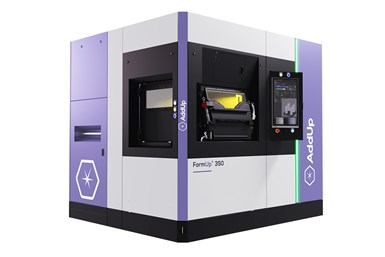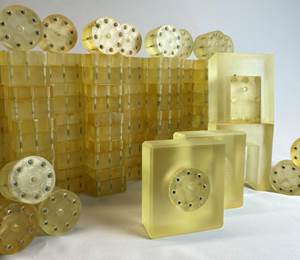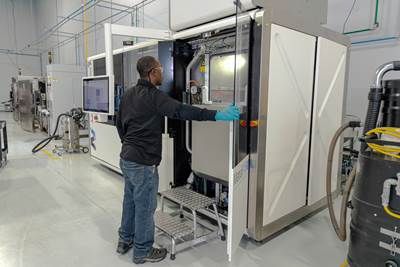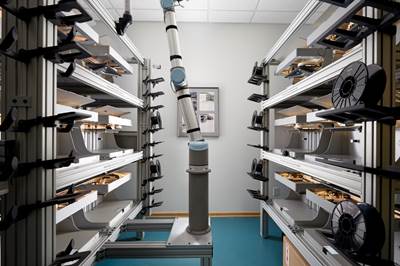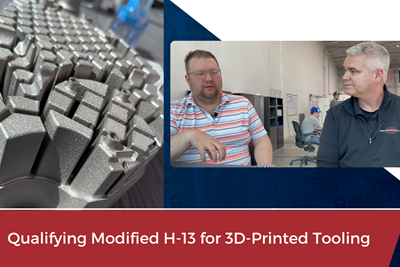AddUp, WBA Investigate Additive Manufacturing for Moldmaking Tooling Study
The additive manufacturing (AM) tooling study focused on six select companies, offering them the opportunity to test the introduction of AM and specifically implement the technical and economic advantages of AM technology for their injection molds.
AddUp and the WBA Aachener Werkzeugbau Akademie are proving the benefits of metal additive manufacturing (AM) for moldmaking to six toolmaking companies through its tooling study. Launched in January 2023, this consortium study has delivered the first prototypes of injection molds with optimized internal cooling channels.
AddUp is a global metal additive manufacturing OEM for powder bed fusion (PBF) machines, which established its AM Tooling Competence Center in Aachen in partnership with the Werkzeugbau-Akademie (WBA) in early 2023. This facility, also serving as AddUp’s German subsidiary, was created to accelerate the adoption of metal AM by tooling companies. AddUp has extensive experience in the tooling industry developing applications and materials best suited for mold and tool production.
The AM Tooling Competence Center provides a resource for tooling manufacturers to develop their applications and partner with a global leader in PBF technology. The facility is equipped with a FormUp 350 PBF machine and toolmakers have the opportunity to submit application cases for evaluation and to study all aspects of their project, from the design applied to PBF, to the profitability analysis and the study of series production.
AddUp and the WBA are conducting an AM tooling study with six select companies. This first group of companies include Pöppelmann, Siebenwurst, Harting, Zahoransky, GIRA and FRAMAS. The study offered them the opportunity to test the introduction of AM and to specifically implement the technical and economic advantages of AM technology for their injection molds.
The six companies that have participated in the AM Tooling Study have identified their own case studies for parts which have been manufactured using traditional machining processes.
The study is supported by companies like iQTemp (AM design and simulation of cooling channels), Deutsche Edelstahlwerke (AM materials), 3D Laser BW (specialist in mold inserts with near-contour cooling systems and AM service provider), Siemens NX and institutes such as Fraunhofer ILT and ACAM.
Traditionally, injection molding manufacturers must deal with certain constraints inherent to the manufacturing of their molds. The mold’s performance is directly related to its ability to cool the injected parts. PBF technology is adapted to create complex cooling channels, positioned as close as possible to the mold walls. By adapting the shape of the channels to cool the surface of the part more homogeneously, manufacturers can see improved quality and experience higher productivity with a reduction of cooling and cycle times.
The choice of material is critical for toolmakers, as the molds must meet high requirements especially in terms of corrosion resistance, heat conductivity and fatigue. AddUp has 20 years of AM experience with Maraging 300, which is successfully used in series production by Michelin to manufacture more than a million tire molds sipes per year. Additionally, AddUp has developed AM build parameters for the AISI 420 corrosion-resistant tool steel, also referred to in the German standard as 1.2083, which is now available as an AddUp standard additive material for injection molding in the future. AddUp is committed to supporting the tooling industry and continues to develop other materials to maximize productivity and efficiency.
The six companies that have participated in the AM Tooling Study have identified their own case studies for parts which have been manufactured using traditional machining processes. AddUp, with the support of its partners, has evaluated each of these parts to determine how they could be optimized with AM. Each part was then designed for AM, optimized for conformal cooling and manufactured on AddUp’s four-laser FormUp 350. Post-processing was then completed by the tooling company itself or by the WBA. Each of these ready-to-use molds were then sampled on the respective tooling company’s production lines and the comparative data will be provided to the WBA. In the fourth quarter of 2023, the results of this first Tooling Study will be officially published by the WBA during its General Assembly.
For related information, read “German Academy Builds a Bridge Between Industry and Science.”
Related Content
2024 Moldmaking Insights: A Year in Review Part 2
A look back at the top moldmaking trends of 2024, as revealed through MMT's analytics. This review highlights the most popular technical articles, case studies, tips and best practices that captured the industry's attention over the past year.
Read More2024 Moldmaking Insights: A Year in Review Part 1
A look back at the top moldmaking trends of 2024, as revealed through MMT's analytics. This review highlights the most popular technical articles, case studies, tips and best practices that captured the industry's attention over the past year.
Read MoreIn "Hybrid" FIM Process, 3D Printing Complements Injection Molding
Alpine Advanced Materials used a desktop 3D printer and the freeform injection molding process to reduce prototype tooling production time and cost for its customers.
Read More2024 Most-Viewed Products
A comprehensive dive into 2024’s most-viewed products, as revealed through MMT's analytics. This review highlights the most popular products, ranging from technologies, services, softwares and more from this past year.
Read MoreRead Next
The Benefits of Vertically Integrating Metal 3D Printing and Machining
Having 3D printing and machining within one organization enables Addman’s engineers to collaborate and consolidate so it can quickly make successful metal 3D-printed parts.
Read MoreCNC or 3D Printing: 5 Factors to Consider
Accuracy, time, cost, nimbleness and application considerations help to determine if a shop should use CNC machining or 3D printing.
Read MoreVIDEO: Qualifying Modified H-13 for 3D-Printed Tooling
Next Chapter Manufacturing and International Mold Steel discuss their partnership to qualify a modified H-13 for tooling applications.
Read More
